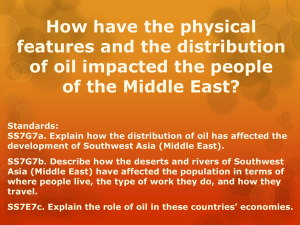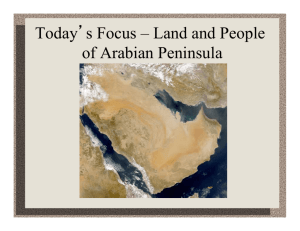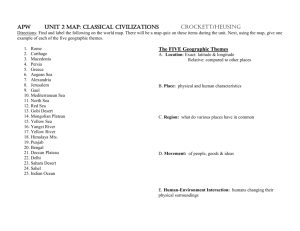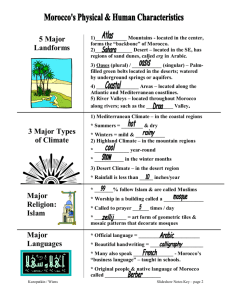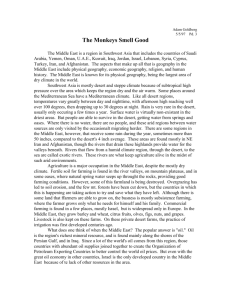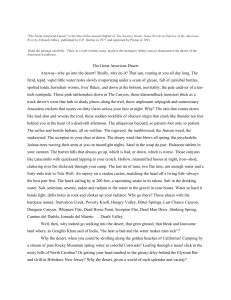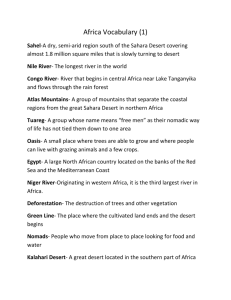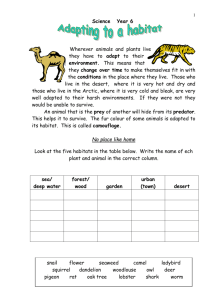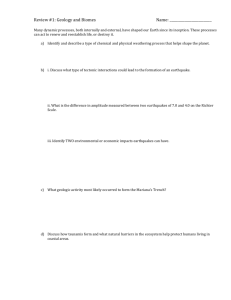glossary - Thomas County Schools
advertisement
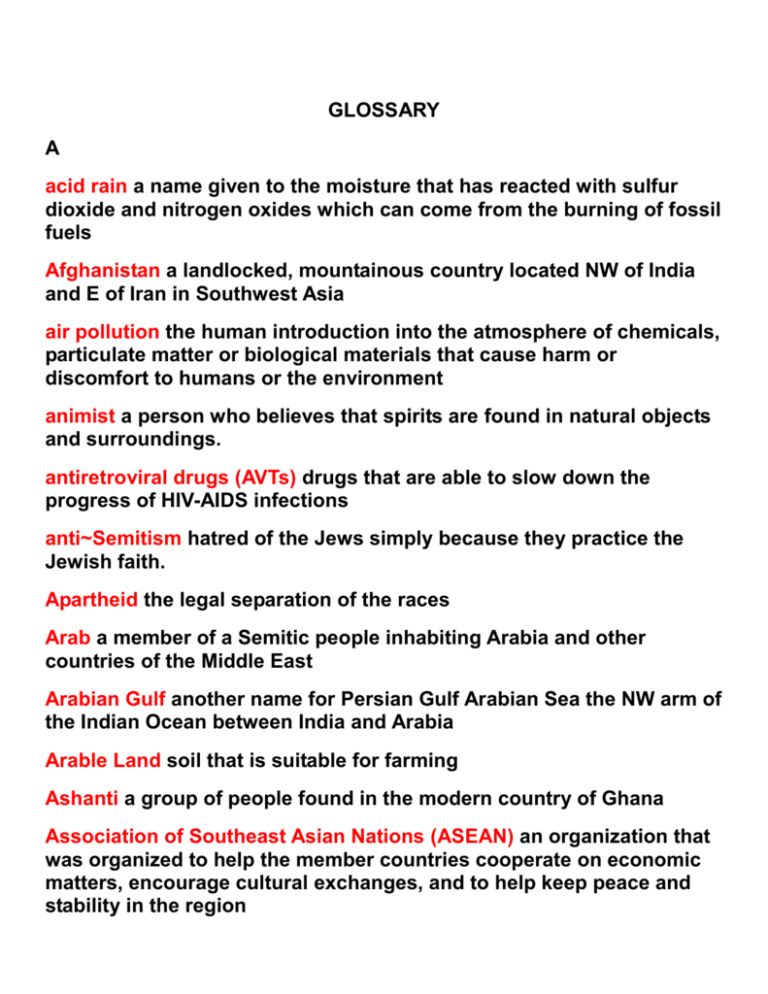
GLOSSARY A acid rain a name given to the moisture that has reacted with sulfur dioxide and nitrogen oxides which can come from the burning of fossil fuels Afghanistan a landlocked, mountainous country located NW of India and E of Iran in Southwest Asia air pollution the human introduction into the atmosphere of chemicals, particulate matter or biological materials that cause harm or discomfort to humans or the environment animist a person who believes that spirits are found in natural objects and surroundings. antiretroviral drugs (AVTs) drugs that are able to slow down the progress of HIV-AIDS infections anti~Semitism hatred of the Jews simply because they practice the Jewish faith. Apartheid the legal separation of the races Arab a member of a Semitic people inhabiting Arabia and other countries of the Middle East Arabian Gulf another name for Persian Gulf Arabian Sea the NW arm of the Indian Ocean between India and Arabia Arable Land soil that is suitable for farming Ashanti a group of people found in the modern country of Ghana Association of Southeast Asian Nations (ASEAN) an organization that was organized to help the member countries cooperate on economic matters, encourage cultural exchanges, and to help keep peace and stability in the region Atlas Mountain Range a group of mountains that separate the coastal regions from the great Sahara Desert in northern Africa Autocratic government system a government in which the ruler has absolute power to do whatever he wishes and make and enforce whatever laws he chooses Automobile emissions the carbons and other chemicals that come from a car’s engine B Bantu a member of any of a large number of linguistically related peoples of central and southern Africa bartering a system in which goods and services are exchanged instead of using cash as a payment in a traditional economy Bill of Rights a document stating the basic freedoms that all citizens may enjoy Brahman the name Hindus have given to the gods they believe are part of a supreme spirit Buddha the name given to the priest of the Buddhist religion; also known as “The Enlightened One” Buddhism a belief that people could find peace if they could reject greed and desire C Cabinet a group of advisors capital goods the factories, machines, and technology that people use to make products to sell capitalism an economic system in which the means of production and distribution are privately or corporately owned and developed caste system a belief that a social class is inherited ceremonial emperor a ruler with no power Chinese Communist Party the name of the ruling party in China Christianity the belief that Jesus Christ is the Son of God civil disobedience the refusal to obey laws even if the result is punishment civil war a war within the same country climate the state of the atmosphere at a particular location over a long period of time; usually discussed in terms of temperature and rainfall Cold War a state of political tension and military rivalry between nations that stops short of full-scale war~ especially that which existed between the United States and Soviet Union following World War II collective all ownership and decision making is in the hands of the government collective farm where people work together and share whatever they’ produce command economy an economy in which a government planning group makes most of the basic economic decisions for the workers communist an economic structure or government that promotes the establishment of a classless society based on common ownership of products and property confederation government system a system in which the local government holds all of the power and the central government depends on the local government for its existence Confucianism the philosophy or ethical system of Confucius which is based on good deeds and morality Congo River begins in central Africa near Lake Tanganyika, flows through central and west Africa through the largest rain forest in Africa for almost 3,000 miles before it reaches the Atlantic Ocean constitutional monarchy a government in which the powers of the ruler are restricted to those granted under the constitution or laws of the nation cooperatives farms that are owned by the government; workers are told what they may produce credit the ability to borrow money Cultural Revolution a name given to China’s attempt in the 1960s to improve its economy by reorganizing its farms, businesses, and most of society currency something that is used as a medium of exchange; money D Deforestation the destruction of trees and other vegetation democracy originates from the Greek word “demos,” which means people; another name for democratic government system democratic government system a political system in which the people play a much greater role in deciding who the rulers are and what decisions are made Democratic Republic of the Congo (Zaire) a large country in central Africa with a coastline on the Atlantic Ocean desalination the process of removing salt and other chemicals from sea water desertification the process of land becoming like a desert, due to deforestation and drought Diet (the) a two-house legislature that is elected by the Japanese people district council a group elected or appointed as a legislative body Dominion having control or the exercise of control over another country Domino Theory a term meaning if one country fell to communism, all the others nearby would fall as well drip irrigation a system, using computers, that measures out how much water each plant receives drought an extended period of time without rainfall E Egypt a large North African country located along the banks of the Red Sea and the Mediterranean coast Eightfold Path the eight rules for conduct that a person practicing the Buddhist religion is to follow during his or her lifetime embargo a trade barrier in which one country announces that it will no longer trade with another country in order to isolate and cause problems with that country’s economy Emperor the male ruler of an empire entrepreneur creative, original thinkers who are willing to take risks to create new businesses and products ethnic group a group of people who share cultural ideas and beliefs that have been a part of their community for generations Euphrates River one of the longest rivers of Southwest Asia which begins in Turkey and flows through Syria and Iraq exchange rate a system of changing from one type of currency (money) to another extinction a dying out of a species of plants or animals F famine extreme and general scarcity of food federal government system a political system in which power is shared between the national and local governments, including executive, legislative, and judicial branches federal republic a government in which elected individuals make decisions for the people Five Pillars of Islam five things Muslims must do during their lifetime in their practice of Islam fossil water- water that has been underground for centuries four main castes the division of the caste system in the Hindu religion Four Modernizations a name given to China’s attempt in the 1970s to reorganize its economy Four Noble Truths the four phases of the Buddhist religion free enterprise a business governed by the laws of supply and demand, not restrained by government interference G Ganges Action Plan a plan begun in 1985 to try and clean up the Ganges River Gaza Strip a coastal region at the southeastern corner of. the Mediterranean Sea bordering Israel and Egypt Golden Rule of Behavior a belief from, the religion of Confucianism religion that “What you do not like when done unto yourself, do not unto others” Grand Canal one of the world’s oldest and longest canal systems (built more than 2,000 years ago) connecting the Yangtze and Huang He rivers Great Leap Forward a name given to China’s attempt in the 1950s to reorganize its economy Green Line the place where the cultivated land ends and the desert begins Green Revolution a name given to the time period in India in the 1960s when they tried to modernize their agricultural system by introducing new types of seeds and grains, and fertilizer and pesticides were made available gross domestic product (GDP) the value of all goods and services produced within a nation in a given year H hereditary monarchy the government is led by a king who comes from a family that has ruled the country for several generations Hinduism the worship of many gods that are a part of a supreme spirit named Brahman Holocaust a time when over six million Jews were killed in concentration camps set up by Germany human capital the knowledge and skills that make it possible for workers to earn a living producing goods or services hydroelectic power electricity produced from the energy of running water I income the monetary payment received for goods or services, or from other sources, as rents or investments Indian National Congress a two-house legislature made up of representatives elected from all across the country of India invest to put money to use in something offering potential profitable returns, as interest, income, or appreciation in value Iran west of Afghanistan; one of the largest countries in Southwest Asia Iraq a country west of Iran which has the advantage of having two of the largest rivers in the region, the Tigris and Euphrates irrigation providing water for crops Islam the religious faith of Muslims, based on the words and religious system founded by the prophet Muhammad Israel a republic in SW Asia, on the Mediterranean Sea; created in 1948 by the United Nations as a home to the Jewish people of the world J Jordan River a smaller but important river that begins in the southern end of the Sea of Galilee and flows into the Dead Sea Judaism a religious group of Jews who believe in one God K Kalahari Desert a great desert located in the southern part of Africa kami the divine spirit that followers of the Shinto’s religion believe live in nature; means superior in Japanese language Karma the belief that one’s actions determine one’s fate Kenya a country located along the eastern coast of Africa bordering the Indian Ocean Klerk, F. W. de the South African president who, in 1990, freed Nelson Mandela from prison after he had served 27 years Kurds a distinct ethnic group that lives in the mountainous areas where Syria, Turkey, Iran, and Iraq come together L laissez-faire a French phrase that means to allow them to do as they please Lake Tanganyika one of the largest freshwater lakes in the world and one of the deepest lakes in the world, located in the Great Rift Valley Lake Victoria the largest lake in Africa literacy the ability to read and write loess another name for the silt or sediment that is deposited along a river’s path, creating rich soil for farmers Long March the name given to the 6000 mile journey that Mao Zedong and his followers took to avoid capture by the Chinese government M MacArthur Constitution a name given to the constitution that was written by General Douglas MacArthur (the American commander of the occupation forces) after World War Il for Japan MacArthur, General Douglas the American commander given the job of rebuilding Japan after World War II Mahatma a name given to Mohandas Gandhi, a politician in India, who was instrumental in helping India gain its freedom from British colonial rule; means “Great Soul” Mandela, Nelson South African statesman who fought against apartheid and was released from prison to become the nation’s first democratically elected president in 1994 market economy an economy in which a society’s economic decisions are made by individuals who decide what to produce and what to buy micro-credit industry the extension of very small loans to the unemployed and to others living in poverty that are not considered a good financial risk Middle Way (The) the goals that were to be accomplished by following what Buddha called the Eightfold Path (eight rules for conduct) in the religion of Buddhism mila local beliefs the Swahili follow; for example, spirits can possess a person and there is a close link between their religious beliefs and the practice of medicine and healing mineral deposits a mass of naturally occurring mineral material, usually of economic value; such as lead, zinc, gold, or silver mineral resources a natural resource such as coal, iron ore, gold, or silver that are of economic value Ministry of International Trade and Industry (MITI) a group that helps companies decide what products will sell best on the global market mixed economy an economy that has characteristics of both market and command economic systems monarchy a government where a king and his advisors make most of the decisions; it is a type of unitary government monsoon a seasonal prevailing wind, lasting several months, bringing heavy rains often causing great hardships for those living in the area due to flooding Muhammad an Arabic prophet who founded Islam Muslim a name given to the followers of the Islam Religion Muslim League a group organized in 1855 in an effort to put more power into the hands of Indians National People’s Congress a group of people elected every five years by a vote N nationalism the loyalty to a group with whom one shares a common history, culture and/or religion natural resource something that is in or supplied by our natural environment and can be consumed or used by people Niger River originating in western Africa, it is the third largest river in Africa, flowing from Guinea over 2600 miles to the African coast Nigeria a large nation on the coast of West Africa that has nearly every kind of habitat found in Africa Nile River the longest river in the world which begins in the central mountains of Africa, runs through Ethiopia, Sudan, and Egypt, and flows northward over 4,000 miles until it reaches the Mediterranean Sea at Alexandria, Egypt Nirvana name given to reaching a state of perfect peace in the religion of Buddhism nomads people who move from place to place, usually traveling by camel, looking for water or food non-violence a lack of violence O oasis a small place where trees are able to grow and where people can live with grazing animals and a few crops oil one of the most important and valuable fossil fuels oligarchy government system a system in which a political party or other small group takes over a government and makes all of the major decisions; government by the few OPEC Organization of Petroleum Exporting Countries founded to set oil prices and policies Operation Desert Storm another name for the Persian Gulf War Operation Iraqi Freedom an invasion led by the United States in 2003 to stop the development of nuclear weapons by Iraq Ottoman Empire an empire that controlled much of the Middle East or Southwest Asia from the 1300’s until the end of World War I Pan-African movement the desire for people of African descent, no matter where they lived in the world, to think of Africa as a homeland parliament the name given to the group of people elected to run a parliamentary system of government parliamentary democratic government a democratic form of government in which the people vote for those who represent the political party they feet best represents their views of how the government should operate peninsula a body of land that is surrounded by water on three sides per capita (GDP) the amount of goods and services produced compared to the number of people Persian Gulf one of the main shipping routes for oil to be shipped out from the rich fields of Kuwait, Saudia Arabia, Iran and other countries that line its shores; also known as Arabian Gulf Persian Gulf War a military force used to liberate Kuwait from the Iraqi invasion in 1991; also called Operation Desert Storm Persians people who live in the modern country of Iran Political Bureau of the Communist Party a small group of men who make all of the decisions on how the Chinese government and life in that country should be organized premier a name given to a chief administrator of a government president the chief executive of a government presidential form of democratic government sometimes called a congressional form of government; in this type of government a president is chosen to be the leader prime minister the name given to the head of government; chief executive of a parliamentary democracy productive resources the use of natural, human, and capital to produce goods and services that you expect to sell for a price high enough to cover production costs protective tariff a tax placed on goods coming from another country Q qanats Underground tunnels in Southwest Asia that bring water from the hills to dry plains quota a way of limiting the amount of foreign goods that can come into a country Quran the holy book of the Islam religion R rainforest areas with hot, humid, tropical climates and dense, evergreen forests with trees hundreds of feet tall rate of return the gain or loss of an investment over a specified period, expressed as a percentage increase over the initial investment cost Red Army a name given to the communist army in the Republic of China Red Guard the name of the new army of young people Mao Zedong used to enforce his policies in the 1960s refugees people who have to leave their homes as the result of war reincarnation a belief that the soul does not die with the body, but enters the body of another being, either a person or an animal religious group a group with a belief system in a god or gods, with a specific set of rituals and literature reparations the payment for damages done to property republic a state in which the supreme power rests in the body of citizens entitled to vote Republic of Sudan located just south of Egypt in southeastern Africa, Sudan is the largest country in Africa and also the largest among the countries that make up the Arab world respiratory disease those diseases of the lungs, bronchial tubes, and trachea in the human body robotics using mechanical techniques with robots to assemble goods or products Rub Al-Khali a desert in southern Saudia Arabia that means “empty quarter” S Sahara Desert the largest desert on planet Earth covering over 3.5 million square miles Sahel a dry, semi-arid region south of the Sahara Desert covering almost 1,800,000 square miles that is slowly turning into desert land. It serves as a transition region between the harsh desert to the north and the grasslands and rain forest to the south and stretches from the Atlantic Ocean to the Red Sea. The word Sahel means “border” or “margin.” Saudia Arabia the largest country of the Arabian Peninsula in Southwest Asia; controlled by a monarchy savanna a vast area of both grassland and more tropical habitats in the middle of Africa close to the equator savings the money that you have not spent after buying things you want secular a word meaning it favors no special religion sediment the topsoil, silt and minerals from the mountains that is gradually spread along the path of a river enriching the farmland and creating a large, fertile delta at the mouth of a river Shia Muslims the second largest denomination of Islam Shintoism the earliest religion in Japan which means “way of the gods” silt rich topsoil, carried by floodwaters South Africa a country located at the very southern tip of the African continent that is mostly a broad plateau with large stretches of grasslands in the interior Special Economic Zones a name given to those areas that were set up along the coastal areas to try to encourage foreign companies to do business with China specialization those products a country makes best and that are in demand on the world market specialize to train or devote oneself to a particular area of study or occupation Strait of Hormuz a very narrow waterway in which ships must navigate to and from the Persian Gulf subsistence farming growing food to provide for the sustenance of your family Sudan also called Republic of Sudan; the largest African country by area Suez Canal a canal in Egypt that allows water transportation between Europe and Asia without the need of traveling around the southern tip of Africa Sunni Muslims the largest denomination of slam Swahili a people and culture found on the coast of east Africa Syrian Desert a very large desert shared between Syria and Iraq T Taliban a radical Muslim government of Afghanistan tariff a tax placed on goods when they are brought into one country from another country. theocracy a government in which God is seen as the true leader and religious leaders serve as the political leaders Tiananmen Square a large plaza in central Beijing, China: noted esp. as the site of major student demonstrations in 1989 suppressed by the government Tigris River river that begins in Turkey and flows through Iraq trade barriers anything that slows down or prevents one country from exchanging goods with another tradition something that has been passed down in a culture from one generation to the next traditional economy an economy in which most of the economic decisions that are made are based on custom and on the habit of how such decisions were made in the past Tuareg a group whose name means “free men,” as their nomadic way of life has not tied them down to one area Turkey a country located to the north and west of Iraq, where the Tigris and Euphrates rivers begin typhoon a tropical storm U underground aquifers layers of underground rock where water runoff from rains and streams is trapped unitary government system local governments such as state or county systems may have some power but they are under the control of the central government United Nations an international organization formed after World War Il whose aims are to facilitate cooperation in international law and international security V value per capita a phrase meaning per person Vedas (also referred to as The Book of Knowledge) a book containing prayers and rituals of the Hindu religion Vietminh League a group that had Vietnamese independence as its goal voluntary trade both parties in the transaction see that they will be able to gain something from the exchange; ideally there is no government restriction or regulation, either between individuals or between countries W water pollution contamination of water supplies due to chemicals, fertilizer, sewage and other garbage water treatment facilities a process of removing contaminants from waste water Y Yalta Agreement an agreement signed by Germany and Japan after World War II that called for allied countries to temporarily occupy the lands where their troops were when the war ended Z Zedong, Mao a founder of the Chinese Communist Party (1921), he led the Long March (1934-1935) and proclaimed the People’s Republic of China in 1949 Zionists a group who felt the world’s Jews deserved to return to a homeland in Zion
